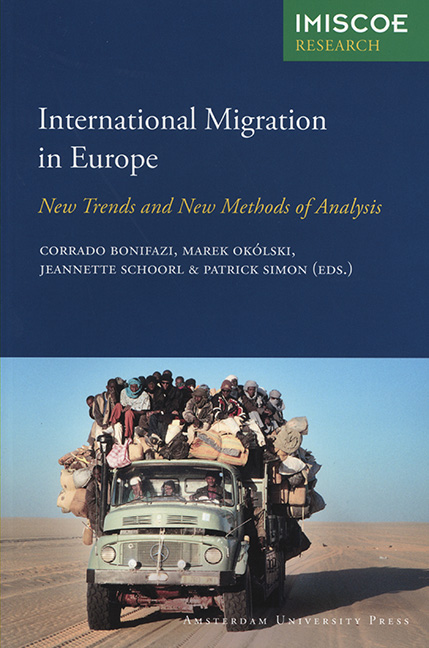Book contents
- Frontmatter
- Contents
- Preface
- 1 Introduction
- PART I NEW FORMS OF MIGRATION IN EUROPE
- PART II EVOLUTION OF REGIONAL PATTERNS OF INTERNATIONAL MIGRATION IN EUROPE
- PART III MEASURING INTEGRATION: IMMIGRANTS AND THE SECOND GENERATION
- PART IV SPECIAL SURVEYS IN INTERNATIONAL MIGRATION STUDIES
- List of Contributors
- Index
- Other IMISCOE Titles
11 - What Integrates the Second Generation? Factors Affecting Family Transitions To Adulthood in Sweden
Published online by Cambridge University Press: 22 June 2021
- Frontmatter
- Contents
- Preface
- 1 Introduction
- PART I NEW FORMS OF MIGRATION IN EUROPE
- PART II EVOLUTION OF REGIONAL PATTERNS OF INTERNATIONAL MIGRATION IN EUROPE
- PART III MEASURING INTEGRATION: IMMIGRANTS AND THE SECOND GENERATION
- PART IV SPECIAL SURVEYS IN INTERNATIONAL MIGRATION STUDIES
- List of Contributors
- Index
- Other IMISCOE Titles
Summary
Introduction
While there have been many studies of immigrant adaptation in the public spheres of work, school and politics and some on select family dimensions (for example fertility and divorce), few have focused on family relationships among immigrants, either generationally or between partners. Even fewer studies have investigated immigrant groups from a ‘gendered’ perspective, going beyond gender differences in labourforce participation and economic activities to investigate gender roles and attitudes of immigrants and their adult sons and daughters. Several major research reviews have highlighted the importance of studying family relationships and the critical role of gender relationships that characterise immigrants, and have called attention to these lacunae in the research literature (for reviews, see Hugo 1997; Bjerén 1997; Pedraza 1991).
Research in various countries has documented the important role of family relationships for the social and economic integration of immigrants. Families are a source of values conveyed across the generations and are also a resource for immigrants in their adaptation to their place of destination. Families normally assist in the initial settlement and the economic adjustment of immigrants, forming social and economic networks for immigrant integration. Over time, families assist in the socialisation of the next generation, the native-born of foreignborn parents, in learning how to adjust to the new society and in retaining or redefining the culture and values of their origins (see Brubaker 2001; Portes 1995; Zhou 2001). Hence families are particularly important for those of foreign-born origins and are more problematic, providing many of the resources needed for success in the new society and a ‘brake’ on assimilation into the new society. The examination of the relative balance of these family processes has become a critical part of an assessment of the integration and inclusion of immigrants and their children.
A focus on the ‘private sphere’ of the family directly raises the question of gender relationships. The roles of women and men in families are challenged by the potential family generational break brought about by the immigration process when gender roles differ in the new society. When these differences are reinforced at work and in school, relationships between husbands and wives and between parents and their sons and daughters are often strained. These generational tensions and strains are increased when the cultural differences and social expectations of the places of origin and destination are greater.
- Type
- Chapter
- Information
- International Migration in EuropeNew Trends and New Methods of Analysis, pp. 225 - 246Publisher: Amsterdam University PressPrint publication year: 2008



